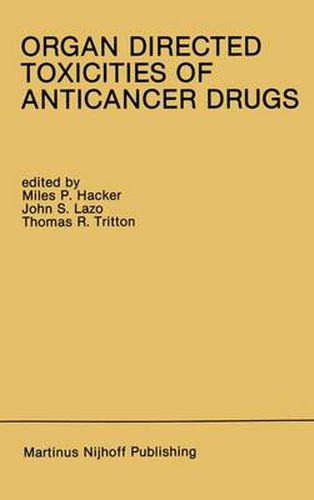Readings Newsletter
Become a Readings Member to make your shopping experience even easier.
Sign in or sign up for free!
You’re not far away from qualifying for FREE standard shipping within Australia
You’ve qualified for FREE standard shipping within Australia
The cart is loading…






This title is printed to order. This book may have been self-published. If so, we cannot guarantee the quality of the content. In the main most books will have gone through the editing process however some may not. We therefore suggest that you be aware of this before ordering this book. If in doubt check either the author or publisher’s details as we are unable to accept any returns unless they are faulty. Please contact us if you have any questions.
The addition of chemotherapy as an effective means to treat cancer has had a major impact on selected human malignancies. Due to a general inability to dif ferentiate between normal and neoplastic cells, little selectivity exists in currently used oncolytic drugs. Consequently, significant toxicity to the patient is expected when systemic cancer chemotherapy is chosen as an appropriate therapeutic in tervention. Much of this toxicity, such as damage to the bone marrow, gastroin testinal tract, or hair follicles, is predictable based upon the fact that anticancer drugs kill actively dividing cells. These types of toxicities, while serious, are usually manageable and reversible and are, therefore, not often considered to be dose limiting. Unfortunately, several of the most important anticancer drugs also damage tissues in which the growth fraction is relatively small. Such toxicities can not be predicted based on the chemical structure of the drugs, are often not detected in preclinical studies, and are encountered frequently for the first time in clinical studies. Further, unlike most of the proliferative-dependent toxicities, the unpre dicted toxicities are usually irreversible or only partially reversible upon cessation of drug administration. Because of this, the unpredicted toxicities are referred to as dose limiting. They represent a significant barrier to the ultimate efficacy of several of our most important anticancer drugs.
$9.00 standard shipping within Australia
FREE standard shipping within Australia for orders over $100.00
Express & International shipping calculated at checkout
This title is printed to order. This book may have been self-published. If so, we cannot guarantee the quality of the content. In the main most books will have gone through the editing process however some may not. We therefore suggest that you be aware of this before ordering this book. If in doubt check either the author or publisher’s details as we are unable to accept any returns unless they are faulty. Please contact us if you have any questions.
The addition of chemotherapy as an effective means to treat cancer has had a major impact on selected human malignancies. Due to a general inability to dif ferentiate between normal and neoplastic cells, little selectivity exists in currently used oncolytic drugs. Consequently, significant toxicity to the patient is expected when systemic cancer chemotherapy is chosen as an appropriate therapeutic in tervention. Much of this toxicity, such as damage to the bone marrow, gastroin testinal tract, or hair follicles, is predictable based upon the fact that anticancer drugs kill actively dividing cells. These types of toxicities, while serious, are usually manageable and reversible and are, therefore, not often considered to be dose limiting. Unfortunately, several of the most important anticancer drugs also damage tissues in which the growth fraction is relatively small. Such toxicities can not be predicted based on the chemical structure of the drugs, are often not detected in preclinical studies, and are encountered frequently for the first time in clinical studies. Further, unlike most of the proliferative-dependent toxicities, the unpre dicted toxicities are usually irreversible or only partially reversible upon cessation of drug administration. Because of this, the unpredicted toxicities are referred to as dose limiting. They represent a significant barrier to the ultimate efficacy of several of our most important anticancer drugs.